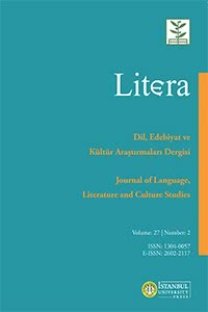21. Yüzyıl Britanya’sının ‘Ötekileri’ olarak Göçmenler: Rachel De-lahay’ın Toplumsal Gerçekçi-Politik Tiyatrosunda Etnik Köken, Kültürel Kimlik ve Eleştirel Irk Kuramı
Bu makale, Rachel De-lahay’ın The Westbridge (2011), Routes (2013) ve Circles (2014) oyunlarını merkeze alarak yazarın tiyatrosunu, çoklu kültürler arasında zorunlu olarak bocalayan kimliklerin çelişkili doğası ve dramaturjik prensipler temelinde ifade edilen gerçekliğin temsili açısından incelemeyi amaçlar. Karakterlerin dili kimlik inşasında bir teatral donanım olarak ne ölçüde kullandıkları ve oyun yazarının çatışan kimlikleri temsil etmek için dramatik temelleri kullanma stratejisi bu araştırmaya tabi tutulur. Bunun yanı sıra, kültürel ve kimlik çatışmalarının dramatik çatışmaya ne ölçüde evrimleştiği oyun yazarının yapıtları aracılığıyla aydınlatılatılır. Kısmen kültürel yapı ve kimliği oluşturan kültür-dinsel davranışçılığa ilişkin dini ve geleneksel görüşler de oyunlarla ve yazarın düşünceleriyle ilişkilendirilir. Bunlar yazarın sosyo-politik ve sosyo-realist bakış açısıyla harmanlanarak, ilgili analizler yapılır ve De-lahay’ın ‘öteki’ kavramına dair yaklaşımı da göz önüne alınır. Tüm bunlara ek olarak, Britanya’da son dönemlerde fark edilir ölçüde beliren ırksal sorunlar ve ırkçılık ve bunların Britanya’daki göçmenler üzerindeki doğrudan etkileri, kritik ırk kuramına ilişkin olarak oyunlardaki beyaz olmayan karakterler aracılığıyla bu araştırmaya dahil edilir.
Immigrants as ‘Others’ of 21st Century Britain: Ethnicity, Culturo-Religious Identity and Critical Race Theory in Rachel De-lahay’s Social Realist-Political Theatre
This article addresses Rachel De-lahay and her plays The Westbridge (2011), Routes(2013), and Circles (2014) aiming, in a broad sense, to observe De-lahay’s theatre in terms of the contradictory nature of identities inexorably fluctuating among multi-cultures, and the representation of reality as represented within the milieu of dramaturgical fundamentals. To what extent the characters’ language is used as a theatrical armament in the making of identity, as well as the playwright’s strategy in using dramatic basics to represent the conflicting identities are subjected to this exploration. As well as this, to what extent the cultural and identity conflicts are evolved into the dramatic conflict will be illuminated through the playwright’s oeuvres. The religious and traditional views regarding culturo-religious behaviourism that partly constitutes cultural structure and identity will also be associated. These will be blended with the playwright’s socio-political and socio-realist point of view; relevant analyses will be conducted and De-lahay’s approach to the concept of ‘other’ will also be considered. In addition to all these, the recent signs of race and racism—with a keen interest in non-white portrayals—and their direct influence on the immigrants in Britain-as represented in the plays- will be included in this exploration in relation to race theory.
Keywords:
Rachel De-lahay, contemporary British theatre, critical race theory, political theatre social realist theatre,
___
Alberge, Dalya and Mark Brown. (8 Dec 2014). Actor Janet Suzman criticised for calling theatre ‘a white invention’ in The Guardian. https://www.theguardian.com/stage/2014/dec/08/actor-janet-suzman-criticised-calling-theatre-white-inventionAnon. (2 June 2012). Observations: One To Watch – Rachel Delahay, Playwright, 28. Independent. https://www.independent.co.uk/arts-entertainment/theatre-dance/features/observations-one-to-watch-rachel-de-lahay-playwright-28-7811253.html
Bhabha, Homi. (1994). The Location of Culture. New York: Routledge.
Bentley, Eric. (2016). Writing for a political theatre. PAJ: A Journal of Performance and Art. 38:1, 39-52
Bredrin. https://en.wiktionary.org/wiki/bredrin
Boal, Augusto. (2008). The Theatre of the Oppressed. London: Pluto Press.
Chawana, Midas. (2014). The appearance and significance of rastafari cultural aspects in South Africa. New Contree, No. 71, pp. 92-113.
Cole, Mike et.al. (2007). ‘Shut the f*** up’, ‘you have no rights here’: Critical Race Theory and Racialisation in post-7/7 racist Britain. Journal for Critical Education Policy Studies, v5 n1, pp. 94-120.
De-lahay, Rachel. (2013). Routes. London: Bloomsbury.
De-lahay, Rachel. (2014). Circles. London: Bloomsbury.
De-lahay, Rachel. (2015). The Westbridge. In Contemporary English Plays (ed. Alex Sierz), London: Bloomsbury.
Delgado, Richard and Jean Stefancic. (2001). Critical Race Theory: An Introduction. New York: NYUP.
Evans, David. (Ed.). (2015). Language and Identity. London: Bloomsbury.
Fanon, Frantz. (2008). Black Skin White Masks. London: Pluto Press.
Hall, Stuart and Paul de Gay. (Eds.) (2003). Questions of Cultural Identity. London: Sage.
Hall, Stuart. (Ed.). (2003). Representation: Cultural Representations and Signifying Practices, London: Sage.
Kellaway, Kate (interview with the playwright- 19 March 2017). Rachel De-lahay: ‘Being a brown woman is political in itself ’ https://www.theguardian.com/stage/2017/mar/19/rache-de-lahay-interview-my-white-best-friend-being-a-brown-woman-is-political
Kelleher, Joe. (2009). Theatre and Politics. London: Palgrave Macmillan. Kirby, Michael. (1975). On political theatre. The Drama Review: TDR, 19(2), 129.
Kundnani, Arun. (2007). The End of Tolerance: Racism in 21st Century Britain. London: Pluto Press.
Kuo, Kelly Chien-Hui. (2003) A euphoria of transcultural hybridity: Is multiculturalism possible? Postcolonial Studies: Culture, Politics, Economy, 6:2, 223-235
Loomba, Ania and J. Burton. (2007). Race in Early Modern England: A Documentary Companion. New York: Palgrave Macmillan.
Love, Catherine (interview with the playwright- 27 May 2014) Rachel De-lahay: ‘I was desperate for a creative outlet’ https://www.whatsonstage.com/london-theatre/news/rachel-de-lahay-i-was-desperate-for-a-creative-out_34564.html
McGrath, J. (2002). Theatre and democracy. New Theatre Quarterly, 18(2), 133–139.
McJannet, Linda. (2009). Islam and English drama: a critical history. Early Theatre Vol. 12, No. 2, pp. 183-193
Mountford, Fiona (interview with the playwright). Rachel De-lahay interview: “People risk anything to get here” https://www.independent.co.uk/arts-entertainment/theatre-dance/features/rachel-de-lahay-interview-people-risk-anything-to-get-here-8815062.html
Sardar, Ziauddin. (2008). Introduction to Black Skin White Masks (Frantz Fanon). London: Pluto Press.
Sardar, Ziauddin. (1990). Introducing Cultural Studies. Cambridge: Icon Books.
Shah, Nabila Husson Bibi. (2014). At Sea, In Text, And On Stage: Islam and Muslims in Early Modern English Drama (unpublished MA thesis), University of Birmingham.
Sivanandan, A. (1976). Race, class and the state: the black experience in Britain: For Wesley Dick — poet and prisoner in some answer to his questions. Race & Class, 17(4), 347–368.
Taylor, Gary. (2018). “Strange Bedfellows“ in The Guardian, 2004, Accessed: 11.11.2018 https://www.theguardian.com/stage/2004/nov/18/theatre1
Wann, Louis. (1915). The oriental in Elizabethan drama. Modern Philology, vol. 12, no. 7, p. 441.
Williams, Raymond. (1977). A lecture on realism. Screen, Volume 18, Issue 1, Pages 61–74.
Williams, Raymond. (1965). The Long Revolution. London: Penguin Books.
Williams, Raymond. (1983). Culture and Society. New York: Colombia UP.
- Yayın Aralığı: Yılda 2 Sayı
- Yayıncı: İstanbul Üniversitesi
Sayıdaki Diğer Makaleler
Düşsel ve Gerçek Arasında Doğu’da Seyahat’i Okumak
Troubles Dönemi’nde Baskıya Karşı Dayanmak: Anna Burns’un Milkman Adlı Eseri
Varoluşçu Özgürlük Bağlamında Kadın: Simone de Beauvoir ve İkinci Cinsiyet
Space and Intimate Immensity in Éric Emmanuel Schmitt’s Night of fire
Disguised Subjugation as Education: Colonial and Maternal Pedagogy in Jamaica Kincaid’s Lucy
Gender, Animals, and Gaskell’s Cousin Phillis
